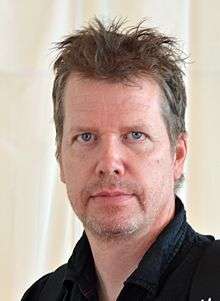Olle Häggström
| Olle Häggström | |
|---|---|
 Olle Häggström in Almedalen 2016. | |
| Born | 1967[1] |
| Nationality | Swedish[2] |
| Awards | Rollo Davidson Prize (2005)[3] |
| Scientific career | |
| Fields | Probability theory |
| Institutions | Chalmers University[1] |
| Website |
www |
Olle Häggström is a professor of mathematical statistics at Chalmers University. He is an elected member of the Royal Swedish Academy of Sciences.[4]
Here Be Dragons
In 2016, Häggström published (via Oxford University Press) Here Be Dragons: Science, Technology and the Future of Humanity, an attempt to draft a road map of potential dangers that could be associated with various emerging technologies: "There is no denying that advances in science and technology have brought us prosperity and improved our lives tremendously... but there is a flip side: some of the advances that may lie ahead of us can actually make us worse off."[5]
On human enhancement, Häggström argues that any enhancement, from growth hormones to cognitive enhancement, can encourage an "arms race" in which everyone is compelled to participate for fear of falling behind: "It is hard to imagine the US silently sitting still and watching a cognitive enhancement development that can turn China into the world’s military overlords." On geoengineering, Häggström discusses a proposed form of geoengineering that involves continuously pumping sulphur dioxide into the atmosphere to counteract global warming, and warns this could create a catastrophic risk of a massive temperature spike if a future generation were unable to continue pumping.[6] On nanotechnology, Häggström discusses concerns about self-replicating nanobots, as well as the potential for emerging manufacturing technologies to undo existing gun control measures and to radically upscale the quantities of existing weaponry, and to create destabilizing new classes of weapons.[2][7] Other topics include existential risks from high-energy physics experiments, as well as from advanced artificial intelligence: Häggström poses a scenario in which a superintelligent computer, aiming to maximise happiness in the universe, calculates that sentient beings are happy less than half the time, and proceeds to exterminate all sentient life, in order to increase the existing sum of happiness a negative number to zero. Häggström also discusses SETI, criticizing "inexcusably reckless" attempts to communicate with aliens.[6]
In a positive review in New Scientist, a reviewer raises the question: "What if extraterrestrial advice could have saved us from some other danger, and we doomed civilisation by not asking?" and cautions there are "no easy answers" to these questions.[6]
See also
References
- 1 2 "Curriculum Vitae as of April 24, 2012" (PDF). Chalmers University. Retrieved 16 December 2016.
- 1 2 "Book reviews". Engineering & Technology (January 2016). Institution of Engineering and Technology. 18 January 2016. Retrieved 16 December 2016.
- ↑ "Rollo Davidson Awards 1976–2015". University of Cambridge. Retrieved 16 December 2016.
- ↑ "Kungliga Vetenskapsakademien - Matematik". Royal Swedish Academy of Sciences. Retrieved 16 December 2016.
- ↑ "Is predicting the future futile or necessary?". Financial Times. 8 January 2016. Retrieved 16 December 2016.
- 1 2 3 "Here Be Dragons: Hostile aliens, tall people and black holes". New Scientist. 30 December 2015. Retrieved 16 December 2016.
- ↑ Häggström, Olle (2016). "5.4: Grey Goo and Other Dangers". Here Be Dragons: Science, Technology and the Future of Humanity. Oxford University Press. ISBN 9780191035395.
External links